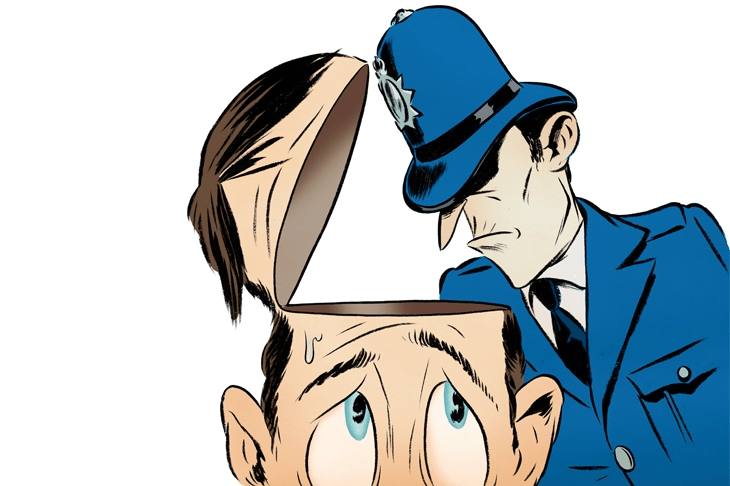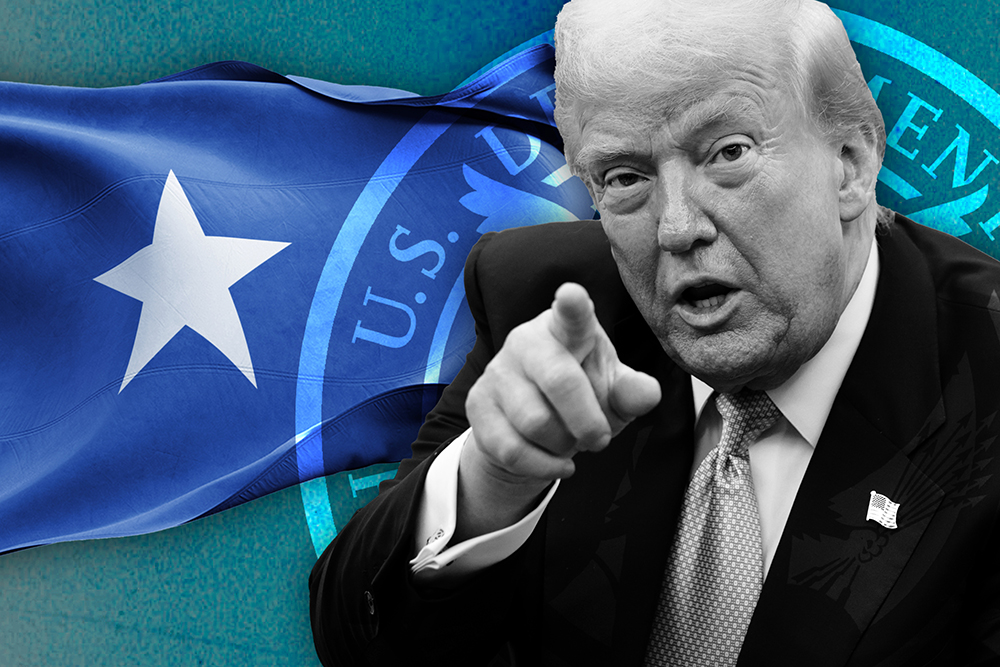Threats to freedom of speech in Britain today typically stem from a combination of two ways of thinking. First, the kindly authoritarian view that it should be the job of the state to protect its citizens from ‘harmful’ speech – and to censor and punish those who cause offence. And second, woke ideology, which means that harm-protection only applies to its favoured groups. So, a trans activist who tells a public audience ‘If you see a Terf, punch them in the… face’ is found to have only been seeking ‘publicity’; while a Christian street preacher is convicted of harassment after calling a trans woman a ‘gentleman’.
For the Labour party, statism coupled with identity politics is not a bug but a feature.
Of course, both these things happened under a Tory government. As an election looms, no one can say that the Conservatives have done much to push back against this grim cultural settlement in their 14 years in office. Yet for the Labour party, statism coupled with identity politics is not a bug but a feature.
Just take its proposal to make ‘LGBT+’ hate crime an aggravated offence, which Keir Starmer delivered to a glossy reception at trans activist media outlet Pink News back in 2022. This will include ‘non-binary and gender diverse people’, meaning that under this law, so-called misgendering could become not merely a crime but merit prison time.
Indeed, the Labour party is so willing to let its virtue-signalling trample free speech that even after the Cass Review, it is still Labour party policy to bring forward a ban on so-called ‘trans conversion therapy’. This could well criminalise clinicians who do not take an ‘affirmative’ approach to patients who present with gender dysphoria – the very approach that Dr Hilary Cass exposed conclusively in her review into NHS gender identity services as being so harmful to children. Labour, in spite of appearing to accept Cass’s findings, still plans to make it illegal not to set vulnerable young patients on a path towards experimental drugs and irreversible surgery.
Then there is its policy on ‘Islamophobia’. Labour backs the All-Party Parliamentary Group on British Muslims definition of Islamophobia, that says it is ‘rooted in racism and is a type of racism that targets expressions of Muslimness or perceived Muslimness’. Labour luvvies may see this as a way of burnishing their woke credentials, but by equating criticism of Islam with racism, this definition would amount to something like a Islamic blasphemy law in 21st century Britain. If this definition of Islamophobia becomes law, criticising the hijab, say, or a verse of the Koran could become a hate crime. Yet this will mean little to a party anxious to court Muslim voters amid pressure from the likes of George Galloway.
Labour also has its eyes on the latest frontier for crusading technocrats worldwide: content regulation online, and with it the spectre of digital ‘disinformation’, ‘misinformation’ and hate speech. Disinformation has been a concern of Labour digital policy since at least 2020, and it’s a threat shadow culture secretary Thangam Debbonaire now says is ‘rampant’. Since the passage of the Online Safety Act last year, if Labour takes power in July, it will inherit a broadcast regulator, Ofcom, gearing up to regulate the internet in the name of safety with a team of more than 350 officials.
The danger with such initiatives is always that zealous regulators will end up stifling political dissent on social media platforms, such as with the EU’s Digital Services Act. One person’s ‘harmful speech’, after all, is another’s robust opinion. Fortunately, free-speech campaigners managed to convince the government to remove the bill’s ‘legal but harmful’ provision.This censor’s charter would have empowered Ofcom to compel social media firms to take down online speech even where it was not against the law. Even still, a government report this week argues that Ofcom needs stronger free speech guardrails in the wake of the Online Safety Act, warning that ‘Ofcom must guard against an overly cautious approach that would lead to disproportionate takedown of vital discussion.’
With parliament dissolved, this report will now gather dust. And with a Labour government, such free-speech concerns will likely fall on deaf ears. Labour came out heavily against removing the ‘legal but harmful’ provision during the bill’s passage last year, with then shadow culture secretary Lucy Powell denouncing this important curb on Ofcom’s remit as a ‘licence to troll’. It has pledged to beef up the law in government.
If a Labour government is bad news for online speech, broadcasters should also be worried. Last week, GB News again found itself in the sights of Ofcom, which is considering whether to impose a ‘statutory sanction’ on the upstart channel, after concluding that a ‘People’s Forum’ programme with Rishi Sunak last year broke ‘due impartiality’ rules. As Toby Young has argued, the spurious reasoning Ofcom gave for the decision suggests that it is little more than a ‘thinly disguised political attack’. Ofcom may claim to be independent, but there is no doubt that it responds to political pressure – we should not forget that it was originally a Blairite quango.
Everyone knows how much Britain’s illiberal establishment disdains GB News. ‘Frankly, what Ofcom should do is shut it down,’ as broadcaster Adam Boulton declared to a nodding Newsnight panel last year after a sexist comment from then GB News presenter, Laurence Fox, sparked gleeful commentariat outrage. More disturbing is that this is implicitly the view of Labour too. Among those denouncing Fox’s boorish outburst was Gordon Brown, saying that Ofcom needed ‘more teeth’ to go after GB News. ‘These people need to be kept off the air’, the party grandee added, referring to Fox and presenter Dan Wootton. In future, Ofcom will likely continue its campaign against GB News. Soon a Labour government may be cheering them on.
This is not to say that the Tories have done a good job safeguarding free speech during their time in office. Ed West is unfortunately not wrong when he says ‘Britain isn’t a free country’ anymore. But make no mistake: when it comes to freedom of speech in Britain, under a Labour government, things can only get worse.







Comments